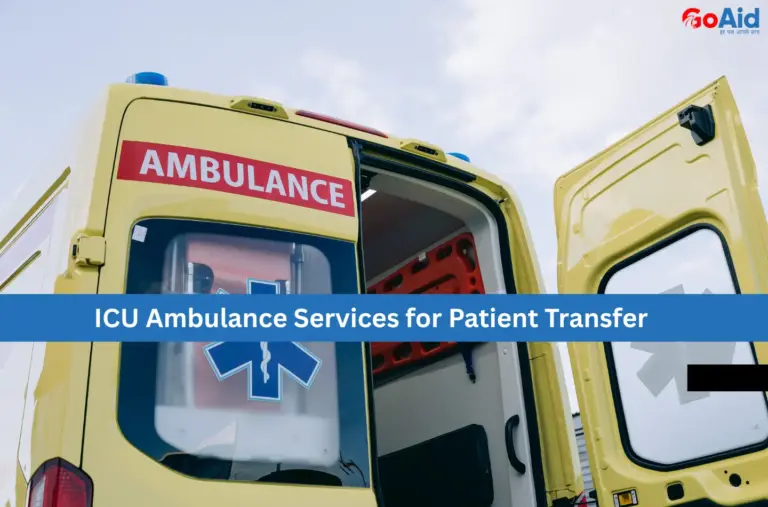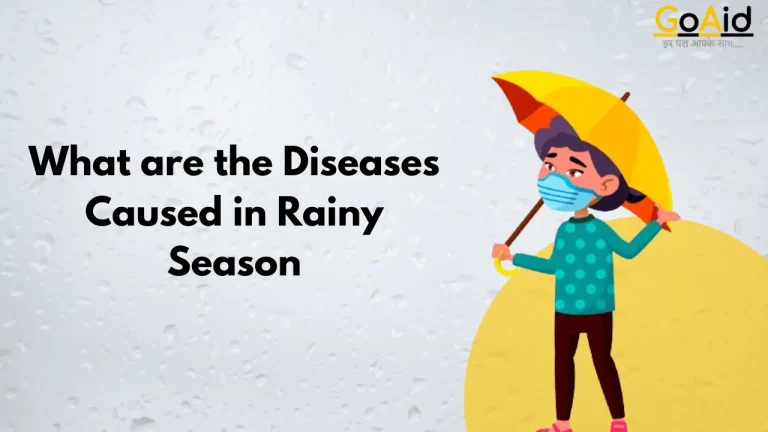Air pollution is one of the growing health concerns in India, and expecting mothers are among the most vulnerable to its harmful effects. The polluted air we breathe can directly impact both maternal and fetal health. This leads to complications such as breathing issues, low birth weight, or even premature delivery.
Understanding these risks and identifying the early symptoms of pollution-related pregnancy problems can help ensure timely care and protection for both mother and baby. GoAid, with its dedicated women-focused ambulance services, is committed to providing safe and quick medical support in such sensitive cases.
This is why, in this blog, we have provided you all the details about how air pollution affects pregnant women, the early symptoms to watch for, when to seek emergency medical help, how GoAid supports expecting mothers, and preventive tips to reduce exposure. Are you willing to know about all these points in detail? Then read this blog to the end.
So, letŌĆÖs start ŌĆō
How Does Air Pollution Impact Pregnant Women and Fetal Health?
Air pollution poses serious health risks for expecting mothers. This affects both maternal well-being and fetal development. This makes timely care crucial.
1. Reduced Oxygen Supply:
Pollutants like carbon monoxide decrease oxygen availability in the bloodstream, which can compromise fetal oxygenation and growth during pregnancy.
2. Low Birth Weight:
Exposure to fine particulate matter (PM2.5) has been linked to babies being born underweight. This increases the risk of developmental complications.
3. Preterm Birth:
Air pollution can trigger early labor. This leads to premature delivery and associated health risks for newborns.
4. Respiratory Issues for Mother:
Pregnant women exposed to high levels of pollutants may experience wheezing, shortness of breath, or asthma flare-ups, complicating pregnancy.
5. Developmental Delays in Fetus:
Long-term exposure to air pollution has been associated with neurodevelopmental issues in children. This includes lower cognitive and motor skills.
6. Increased Risk of Preeclampsia:
Airborne toxins can elevate blood pressure and increase oxidative stress. This raises the risk of preeclampsia during pregnancy.
7. Immune System Weakening:
Pollution exposure can weaken maternal immunity. This makes mothers more susceptible to infections that may indirectly affect fetal health.
8. Heart-Related Complications:
High pollution levels may stress the cardiovascular system. This increases the risk of heart strain or complications in expecting mothers.
9. Gestational Diabetes:
Some studies suggest air pollution can affect insulin regulation. This raises the likelihood of gestational diabetes during pregnancy.
10. Long-Term Child Health Effects:
Exposure in utero may increase the childŌĆÖs risk of asthma, allergies, and other chronic respiratory conditions after birth.
Common Symptoms Expecting Mothers Should Watch For
Pregnant women should monitor their health closely and seek help if these symptoms arise due to air pollution exposure.
- Persistent coughing or wheezing.
- Shortness of breath or difficulty breathing.
- Chest tightness or discomfort.
- Frequent headaches or dizziness.
- Fatigue or unusual tiredness.
- Swelling in hands, feet, or face.
- High blood pressure readings.
- Nausea or vomiting beyond normal pregnancy levels.
- Reduced fetal movements or activity.
- Unusual heart palpitations or irregular heartbeat.
When to Seek Emergency Medical Help During Pregnancy?
Expecting mothers must recognize warning signs and seek immediate medical help to prevent complications and ensure fetal safety.
1. Severe Abdominal Pain or Cramping:
Intense or persistent abdominal pain may indicate complications like preterm labor, placental issues, or miscarriage. Immediate evaluation by a medical professional or GoAid Ambulance for Pregnant Women can prevent serious outcomes.
2. Heavy Vaginal Bleeding:
Excessive bleeding or passing clots is a medical emergency. Prompt intervention via Emergency Care for Expecting Mothers can stabilize the mother and reduce risks to the fetus.
3. Severe Headaches or Vision Changes:
Sudden, intense headaches, blurred vision, or visual disturbances may signal preeclampsia. Rapid medical attention is essential to avoid life-threatening complications.
4. Decreased Fetal Movements:
Significant reduction in fetal activity may indicate fetal distress. Immediate medical evaluation using GoAid Women Ambulance Service ensures timely monitoring and care.
5. High Fever or Infection:
Persistent fever or infection can affect both mother and baby. Emergency care helps prevent dehydration, sepsis, and other complications during pregnancy.
6. Severe Swelling in Hands, Feet, or Face:
Sudden or extreme swelling may indicate hypertension or preeclampsia. Quick assessment and intervention via GoAid Ambulance for Pregnant Women are critical.
7. Difficulty Breathing or Chest Pain:
Respiratory distress or chest pain could signal serious cardiovascular or pulmonary issues. Immediate Emergency Care for Expecting Mothers is vital for maternal and fetal safety.
8. Persistent Vomiting or Dehydration:
Excessive vomiting can lead to dehydration and nutrient loss, harming both mother and fetus. Rapid medical attention ensures fluid and electrolyte balance.
9. Premature Labor Signs:
Regular contractions before 37 weeks, water leakage, or pelvic pressure require urgent response. GoAid Women Ambulance Service ensures safe transport to a hospital.
10. Severe Back Pain with Fever or Bleeding:
This combination may indicate infection or complications requiring emergency evaluation. Quick response through a GoAid Ambulance for Pregnant Women reduces health risks for both mother and baby.
How Does GoAid Support Pregnant Women with Safe Ambulance Services?
GoAid understands the unique needs of expecting mothers, especially in emergencies exacerbated by air pollution or health complications. Their GoAid Ambulance for Pregnant Women provides round-the-clock, specialized transportation equipped with trained paramedics who monitor maternal and fetal health throughout the journey.
Each ambulance is designed with comfortable seating, climate control, and medical equipment such as oxygen, heart monitors, and emergency kits to ensure both safety and comfort.
In addition, GoAid emphasizes Emergency Care for Expecting Mothers. This coordinates directly with hospitals to guarantee a smooth admission process. Pregnant women can book ambulances via the GoAid app or phone.┬Ā
This ensures quick access during critical moments. The trained staff not only provides medical assistance but also emotional support. This reduces stress and anxiety during transit.
GoAidŌĆÖs commitment to safety, reliability, and professionalism makes it the preferred choice for urban expecting mothers. This offers timely, efficient, and secure medical transportation in metro areas and beyond.
Preventive Tips to Reduce Air Pollution Exposure
Air pollution affects pregnant women. Follow these tips to protect yourself and your baby.
1. Stay Indoors During Peak Pollution Hours:
Limit outdoor activities when pollution levels are highest, usually during early morning or late evening, to reduce inhalation of harmful pollutants.
2. Use Air Purifiers at Home:
Install HEPA filters or air purifiers in bedrooms and living areas to maintain clean indoor air, which helps minimize exposure to particulate matter.
3. Avoid High-Traffic Areas:
When commuting, try to avoid busy roads and highways where vehicular emissions are concentrated. Walking or using less polluted routes can reduce exposure.
4. Wear Protective Masks:
Use N95 or equivalent masks when going outdoors in polluted environments, as they effectively filter harmful fine particles that can affect maternal and fetal health.
5. Monitor Air Quality Index (AQI):
Stay updated on daily AQI levels through apps or websites, and plan outdoor activities accordingly to minimize exposure during high pollution days.
6. Keep Windows Closed on High-Pollution Days:
Prevent polluted outdoor air from entering living spaces by keeping windows and doors shut, especially during peak pollution periods.
7. Stay Hydrated and Eat Antioxidant-Rich Foods:
Drinking water and consuming fruits and vegetables rich in antioxidants help combat oxidative stress caused by pollution in the body.
8. Limit Exposure to Indoor Pollutants:
Avoid smoking, incense, or using strong chemical cleaners indoors, as these can worsen air quality and impact pregnancy health.
9. Use Public Transportation or Carpool:
Reducing personal vehicle use decreases emissions and exposure, while also contributing to better overall air quality in metro areas.
10. Consult Doctors Regularly:
Regular prenatal checkups help monitor any pollution-related health effects. This ensures timely interventions if symptoms arise, and maintaining maternal-fetal well-being.
Read More: Need of 24├Ś7 Ambulance Services in Metro Cities
Expert Advice on Managing Pregnancy in Polluted Environments
Experts recommend that pregnant women living in areas with high air pollution take proactive measures to safeguard both their health and fetal development. Limiting outdoor exposure during peak pollution hours.
This uses high-quality air purifiers indoors, and wearing N95 masks when venturing outside are essential steps. Regular prenatal checkups are crucial to monitor maternal and fetal well-being, while staying hydrated and consuming antioxidant-rich foods can help mitigate the effects of pollution.
Medical professionals also stress the importance of being aware of early warning signs such as persistent coughing, shortness of breath, or unusual fatigue. In emergencies. This contacts GoAid Ambulance for Pregnant Women ensures immediate, safe transportation to hospitals with trained paramedics providing Emergency Care for Expecting Mothers.
Maintaining clean indoor air. This avoids high-traffic areas, and using technology to track air quality are practical ways to reduce exposure. By combining preventive strategies with professional medical support, expecting mothers can better navigate pregnancy safely even in polluted environments.
Conclusion
In conclusion, we have provided you all the details about Air Pollution and Pregnancy Risks: Early Symptoms You ShouldnŌĆÖt Ignore. Understanding the effects of pollution, recognizing early warning signs, and seeking timely medical assistance are vital for maternal and fetal health.
GoAid Women Ambulance Service ensures safe, quick, and reliable emergency support for expecting mothers. This reduces risks and providing peace of mind. By following preventive measures and expert guidance, pregnant women can protect themselves and their babies from pollution-related complications effectively.
















